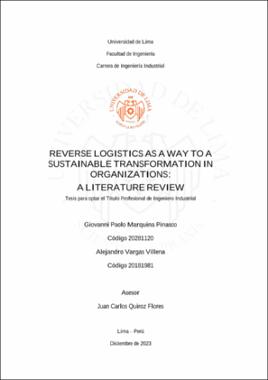Mostrar el registro sencillo del ítem
Reverse logistics as a way to a sustainable transformation in organizations: A literature review
| dc.contributor.advisor | Quiroz Flores, Juan Carlos | |
| dc.contributor.author | Marquina Pinasco, Giovanni Paolo | |
| dc.contributor.author | Vargas Villena, Alejandro | |
| dc.date.accessioned | 2024-03-26T13:51:12Z | |
| dc.date.available | 2024-03-26T13:51:12Z | |
| dc.date.issued | 2023 | |
| dc.identifier.citation | Marquina Pinasco, G. P., & Vargas Villena, A. (2023). Reverse logistics as a way to a sustainable transformation in organizations: A literature review [Tesis para optar el Título Profesional de Ingeniero Industrial, Universidad de Lima]. Repositorio Institucional de la Universidad de Lima. https://hdl.handle.net/20.500.12724/20118 | es_PE |
| dc.identifier.uri | https://hdl.handle.net/20.500.12724/20118 | |
| dc.description.abstract | Currently, the global growth of logistics costs and socio-environmental problems are upward trends. In line with this, reverse logistics is a tool with great potential, as it is a viable alternative to respond to this problem. In this sense, the present research work aims to analyze, compare, and interrelate the existing literature regarding reverse logistics as a solution to the problem posed. For this, a review of the concepts of supply chain, reverse logistics, costs, environmental impact, corporate social reputation, among other concepts was carried out. Then, through the methodology of the systematic review of the literature, the results obtained from the analysis of a universe of thirty papers will be displayed. After the analysis is carried out, the literature behavior and trends will be exposed through the classification of the studies in fourteen categories, with special emphasis on the main benefits found when applying reverse logistics in companies, the most recurrent being the following: socio-environmental, economic, and commercial benefits. These are observed in multiple types of companies, sectors, and geographical spaces. Among them, industrial-type companies stand out in the retail, electronics, and construction sectors in the geographical area of Asia. This showed that the application of reverse logistics is viable, being an ideal path for a sustainable transformation towards more efficient and environmentally friendly operations. | en_EN |
| dc.description.abstract | Actualmente, el crecimiento global de los costos logísticos y los problemas socioambientales son tendencias al alza. En esta línea, la logística inversa es una herramienta con gran potencial, ya que constituye una alternativa viable para dar respuesta a este problema. En este sentido, el presente trabajo de investigación tiene como objetivo analizar, comparar e interrelacionar la literatura existente respecto a la logística inversa como solución al problema planteado. Para ello se realizó una revisión de los conceptos de cadena de suministro, logística inversa, costos, impacto ambiental, reputación social corporativa, entre otros conceptos. Luego, mediante la metodología de la revisión sistemática de la literatura, se mostrarán los resultados obtenidos del análisis de un universo de treinta artículos. Luego de realizado el análisis, se expondrá el comportamiento y tendencias de la literatura a través de la clasificación de los estudios en catorce categorías, con especial énfasis en los principales beneficios encontrados al aplicar la logística inversa en las empresas, siendo los más recurrentes los siguientes: socioambientales. , beneficios económicos y comerciales. Estos se observan en múltiples tipos de empresas, sectores y espacios geográficos. Entre ellas destacan empresas de tipo industrial en los sectores del comercio minorista, la electrónica y la construcción en el área geográfica de Asia. Esto demostró que la aplicación de la logística inversa es viable, siendo un camino ideal para una transformación sostenible hacia operaciones más eficientes y amigables con el medio ambiente. | es_PE |
| dc.format | application/pdf | |
| dc.language.iso | eng | |
| dc.publisher | Universidad de Lima | |
| dc.rights | info:eu-repo/semantics/openAccess | * |
| dc.rights.uri | https://creativecommons.org/licenses/by-nc-sa/4.0/ | * |
| dc.source | Repositorio Institucional - Ulima | |
| dc.source | Universidad de Lima | |
| dc.subject | Logística empresarial | es_PE |
| dc.subject | Desarrollo sostenible | es_PE |
| dc.subject | Contaminación | es_PE |
| dc.subject | Revisión bibliográfica | es_PE |
| dc.subject | Business logistics | en_EN |
| dc.subject | Sustainable development | en_EN |
| dc.subject | Pollution | en_EN |
| dc.subject | Bibliographical revision | en_EN |
| dc.title | Reverse logistics as a way to a sustainable transformation in organizations: A literature review | en_EN |
| dc.type | info:eu-repo/semantics/bachelorThesis | |
| thesis.degree.level | Título Profesional | |
| thesis.degree.discipline | Ingeniería Industrial | es_PE |
| thesis.degree.grantor | Universidad de Lima. Facultad de Ingeniería | |
| dc.publisher.country | PE | |
| dc.type.other | Tesis | |
| thesis.degree.name | Ingeniero Industrial | |
| renati.advisor.orcid | https://orcid.org/0000-0003-1858-4123 | |
| renati.discipline | 722026 | |
| dc.identifier.isni | 121541816 | |
| renati.author.dni | 71249386 | |
| renati.author.dni | 75877936 | |
| renati.level | https://purl.org/pe-repo/renati/level#tituloProfesional | * |
| renati.advisor.dni | 10300285 | |
| renati.juror | Flores Pérez, Alberto Enrique | |
| renati.juror | Collao Diaz, Martin Fidel | |
| renati.juror | Quiroz Flores, Juan Carlos | |
| renati.type | https://purl.org/pe-repo/renati/type#tesis | * |
| dc.subject.ocde | https://purl.org/pe-repo/ocde/ford#2.11.04 | |
| ulima.cat | 015 |
Ficheros en el ítem
Este ítem aparece en la(s) siguiente(s) colección(ones)
-
Tesis [1207]




